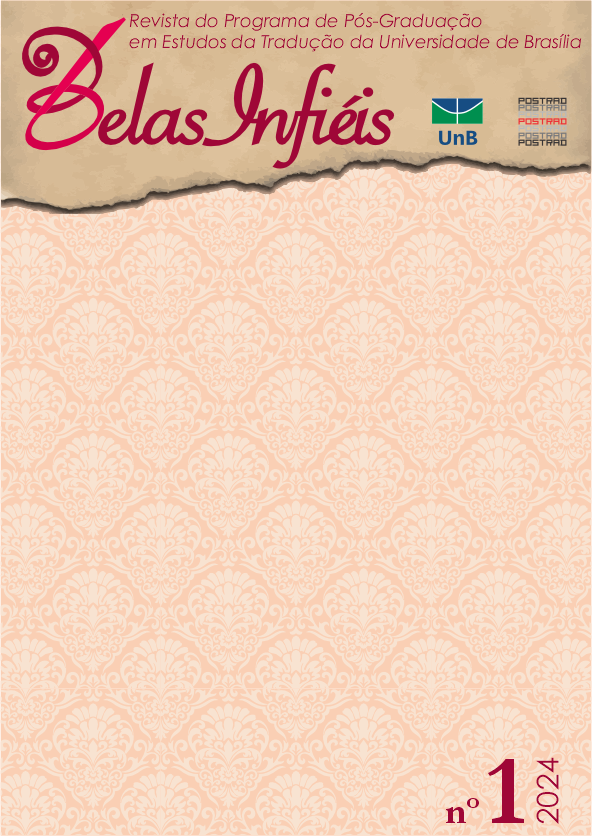O universal e o exótico na recepção de reescritas e traduções de Grande Sertão: Veredas na Alemanha
DOI:
https://doi.org/10.26512/belasinfieis.v13.n1.2024.51045Palavras-chave:
Estudos da Tradução. Tradução literária. Retradução. Reescrita. Guimarães Rosa.Resumo
O presente artigo pretende investigar alguns dos processos de reescrita e retradução pelos quais o romance de João Guimarães Rosa, Grande Sertão: Veredas (1956), passou e passa, com foco na recepção das traduções do livro para a língua alemã e em declarações de atores envolvidos nos diferentes processos de reescrita analisados. A análise será feita apoiando-se nas elaborações sobre reescrita de André Lefevere (1992) e de retradução de Álvaro Faleiros e Thiago Mattos (2017). O estudo parte da tese de Grande Sertão: Veredas (1956) como reescrita crítica de Os Sertões (1902), de Euclides da Cunha, pela primeira tradução para o alemão, Grande Sertão: Roman (1964), feita por Curt Meyer-Clason, e pelo projeto de retradução — ainda não finalizado — de Berthold Zilly. Durante esse percurso, propõe-se uma análise das reescritas de Grande Sertão: Veredas como manipulações que podem motivar leituras da obra a partir de um ponto de vista mais exótico ou universal. O estudo se inicia no olhar mais exotizante do sertão e de seu povo, presente em Os Sertões; parte para a dimensão mais universal conferida ao sertão em Grande Sertão: Veredas; até a primeira tradução de Meyer-Clason, vista novamente pendendo ao exotismo; e conclui na retradução de Zilly, que já se desenha, mesmo antes de sua publicação, como uma reescrita que se propõe mais universal.
Downloads
Referências
Barbosa, F. L. C. (2010). Leituras de Grande sertão: veredas:* sua tradução alemã e a correspondência de Guimarães Rosa com seu tradutor alemão Curt Meyer-Clason. Signótica, 22(1), 57–68. https://doi.org/10.5216/sig.v22i1.12722
Bolle, W. (2004). Grandesertão.br: O romance de formação do Brasil. Editora 34.
Bonomo, D. R. (2010). A biblioteca alemã de João Guimarães Rosa. Pandaemonium Germanicum, (16), 155-183. https://doi.org/10.1590/S1982-88372010000200008
Esteves, B. (2012). O jagunço de Munique. Revista Piauí, (67). https://piaui.folha.uol.com.br/materia/o-jagunco-de-munique/
Faleiros, A., Mattos, T. (2017). A retradução de poetas franceses no Brasil: de Lamartine a Prévert. Rafael Copetti Editor.
Fernando Graça. (8 de dezembro, 2016). Guimarães Rosa - Entrevista raríssima em Berlim (1962) [Vídeo]. Youtube. https://www.youtube.com/watch?v=ndsNFE6SP68&ab_channel=FernandoGra%C3% A7a
Itaú Cultural. (23 de março, 2019). Berthold Zilly - Conexões Itaú Cultural (2008) - Parte 2/3 [Vídeo]. Youtube. https://www.youtube.com/watch?v=Iaq3hoyRuLM&ab_channel=Ita%C3%BACultur al
Kutzenberger, S. (2005). Europa in Grande Sertão: Veredas / Grande Sertão: Veredas in Europa. Editions Rodopi B.V.
Lapelusp. (22 de maio, 2013). Grande Sertão Veredas em Alemão - Palestra de Berthold Zilly [Vídeo]. Youtube. https://www.youtube.com/watch?v=wr7im4vl- AU&ab_channel=lapelusp
Lefevere, A. (1992). Translation, Rewriting, & the Manipulation of Literary Fame. Routledge.
Professor voluntário da UFSC recebe prêmio de tradução na Suíça. (6 de julho, 2019). Notícias da UFSC. Recuperado em 19 de Maio, 2023, em https://noticias.ufsc.br/2019/07/professor-voluntario-da-ufsc-recebe-premio-de- traducao-na-suica/
Rebinski Junior, L. (17 de dezembro, 2012). Especial Capa: Grande sertão alemão. Cândido. https://www.bpp.pr.gov.br/Candido/Pagina/Especial-Capa-Grande-sertao-alemao
Rosenfield, K. (2020). Quecksilbersachen: J.G. Rosa und Curt Meyer-Clason. In: Ette, O., Soethe, P. A. (Eds.), Guimarães Rosa und Meyer-Clason: Literatur, Demokratie, Zusammenlebenswissen. (pp. 247-267). De Gruyter. https://doi.org/10.1515/9783110677713
Thorau, H. (2010). Rezeption mit Rezept: Wie brasilianisches Theater deutsches Theater animiert. In: Bader, W. (Ed.). Deutsch-brasilianische Kulturbeziehungen: Bestandsaufnahme, Herausforderungen, Perspektiven. (pp. 155-170). Vervuert Verlag.
Vejmelka, M. (2008). A Obra de Jorge Amado nas Alemanhas Oriental e Ocidental: suas recepções e traduções. Casa de Palavras.
Ventura, R. (1996). Euclides da Cunha e a República. Estudos Avançados, 10(26), 275-291. https://doi.org/10.1590/S0103-40141996000100024
Zilly, B. (2000). O tradutor implícito. Considerações acerca da translingualidade de Os Sertões. Revista USP, (45), 85-105. https://doi.org/10.11606/issn.2316-9036.v0i45p85-105
Zilly, B. (2017). “Procuro chocar e estranhar o leitor”. Grande Sertão: Veredas – A poética da criação e da tradução. FronteiraZ. Revista Do Programa De Estudos Pós-Graduados Em Literatura E Crítica Literária, (19), 4-31. https://doi.org/10.23925/1983- 4373.2017i19p4-31
Downloads
Publicado
Como Citar
Edição
Seção
Licença
Copyright (c) 2024 CC BY

Este trabalho está licenciado sob uma licença Creative Commons Attribution 4.0 International License.
Dado ao acesso público desta revista, os textos são de uso gratuito, com obrigatoriedade de reconhecimento da autoria original e da publicação inicial nesta revista
A revista permitirá o uso dos trabalhos publicados para fins não comerciais, incluindo direito de enviar o trabalho para bases de dados de acesso público. As contribuições publicadas são de total e exclusiva responsabilidade dos autores.
Os autores, ao submeterem trabalhos para serem avaliados pela revista Belas Infiéis, mantêm os direitos autorais e concedem à revista o direito de primeira publicação, sendo o trabalho licenciado sob a Creative Commons Attribution License Atribuição 4.0 Internacional (CC BY 4.0).



















